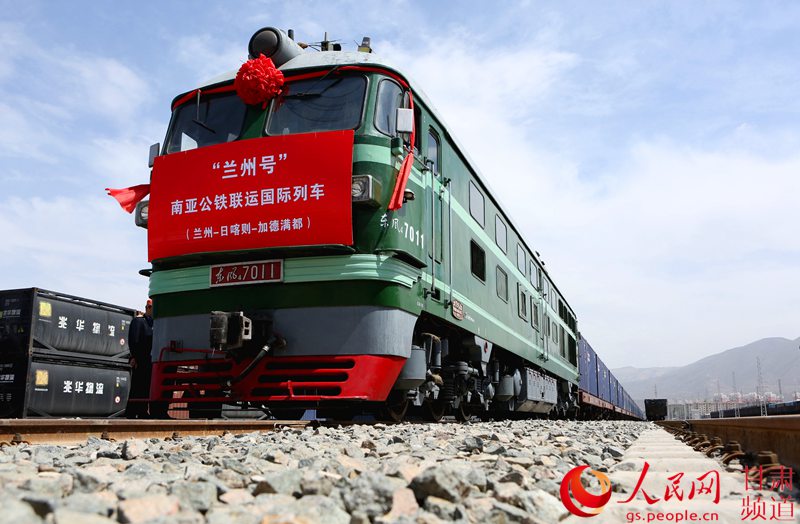Kathmandu, June 3, 2016:Â As China steps up initiatives to extend its railway connection to areas bordering Nepal’s northern districts, the prospects of a Nepal-China railway project have become one of the most talked-about issues here.
Many in Nepal have already started debating whether or not the proposed China railway is really going to connect Kerung, Kathmandu, Pokhara and Lumbini in the near future.
The government, in its new annual budget program, announced that it is to prepare a detailed project report (DPR) in this connection within two years. The announcement has come following a Chinese commitment to provide financial and technical support for the feasibility study and for preparing the DPR. The northern neighbor made the commitment during Prime Minister KP OLi’s China visit in March. During the Oli visit the railway project proposed connecting Kerung-Rashuwagadi to Kathmandu and Kathmandu to Pokhara and Lumbini .
Under its 13th five year plan, China aims to extend its Qinghai-Tibet railway to Kerung by 2020. Kerung is just 27 kilometers from the Nepal-China border point in Rasuwa district. The railway line had arrived in Shigatse from Lhasa in 2014. After completing the 253 km Lhasa-Shigatse portion, China is working on the 450 km Shigatse-Kerung portion.
Chinese experts believed that China is working seriously on this project and that extending the railway to Nepal will not be any big deal as it has already constructed the 1,956 kilometer high-altitude Qinghai-Tibet railway.
According to a Chinese expert in Beijing who works on Tibetan affairs, the project was proposed for the first time in 2014. The idea gathered momentum this year as Nepal realized a need for closer ties with China after facing an unofficial blockade by the Indians for around five months.
During Oli’s China visit, the Nepali delegation had expressed a strong wish for railway extension to Nepal, Zhang Yun, director of the Institute of History Studies of the government-run Tibetology Research Center; informed a group of visiting Nepali and Indian journalists recently.
Citing discussions between Prime Minister Oli and his Chinese counterpart Li Keqiang, he indicated that China wants the railway to also connect India via Nepal, paving the way for trilateral trade and connectivity.
“According to the discussion between Chinese Premier and Nepali counterpart, this railway should connect three countries (China, Nepal and India),” said Zhang during an interaction in Beijing. According to him, extensive and sound preparatory work and research have already been done on railway extension between China and Nepal.
Zhang is a senior member of the research team which advises the Chinese government on Tibetan affairs.
Mahesh Maskey, who was Nepal’s ambassador in China during the Oli visit, explained that China has not set any conditions for extending its railway up to India.
“China has not put forward any condition for extending the railway to India via Kathmandu. But if India is ready for trilateral connectivity Nepal is committed to trilateral cooperation also,” said Maskey.
Maskey further told Republica that the proposed railway project will be a milestone for the economic transformation of Nepal. “As Nepal is now committed to developing the railway I hope China will also expedite the project with much priority,” he said.
Deputy Director General at China’s State Council Information Office, Huang Junxian, told the visiting journalists that China is keen on connectivity and cooperation with both Nepal and India. “I heard that Nepal wants railway extension project to kick off as early as possible. I believe that this demonstrates your [Nepal’s] expectations for greater exchanges and communications between our two countries,” said Huang.
According to Director Zhang at the Tibelotogy Research Center, preparatory work for the railway project has been expedited in China. He also said that although the Nepal side has of late demonstrated a strong will for the extension of the railway, there are two differing schools of thought about this in India– one believing that the extension will enhance bilateral trust and trade and the other fearing that it will undermine Indian interests. He further said, “Premier Li believes that the railway will benefit all and is welcomed by all in Nepal. It is for improvement of our relationship for the common prosperity and enhancing relationship.”
If the Tibet railway connects India with China via Nepal, China hopes that the numbers of pilgrims visiting Mansarovar will increase every year.
Recently, a freight train had carried goods headed for Nepal from Lanzhou in Gansu province to Shigatse. As Tatopani border checkpost, the major connecting point between Nepal and China, was badly damaged by earthquake last year Nepal is now accessing China mainly via Kerung. Zhang said China is also keen on opening six other border points with Nepal as early as possible.
By Ashok Dahal







